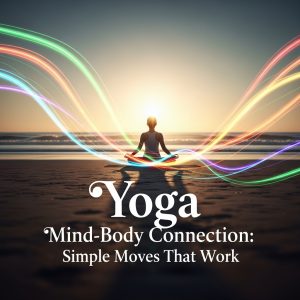There is a quiet strength in one breath. That single inhale and exhale may seem small, but it holds the key to something much greater: the mindful advantage. It's not about doing more or chasing perfection. It's about pausing long enough to notice what truly matters—your presence, your clarity, and your peace. You don’t need a perfect routine or an expensive solution to begin. You only need to arrive fully in the now.
The mindful advantage begins when you create space within. Just one breath invites calm into chaos and allows your brain to reset. It's a practice that protects your brain health while gently improving memory, concentration, and overall mental clarity. It creates a moment of stillness in a world that often pulls you in every direction. These quiet pauses are more powerful than they seem.
Most people overlook the simplest solutions because they feel too easy. But you don't need a grand routine or expensive tools to reclaim your energy and focus. You only need to return to what has always been with you: your breath. It's the quiet force behind emotional balance, a healthier brain, and a more intentional life. This is how you gain an advantage that lasts beyond any trend.
So take that breath now. Inhale softly. Exhale fully. That moment of awareness? That is where it all begins. The mindful advantage doesn't ask for perfection. It only asks for presence. And through that presence, you support every part of your well-being.
What Is the Mindful Advantage?

Think of the mindful advantage as a gentle superpower. It’s the ability to pause, breathe, and truly connect with the present moment. When you do this, you're not just calming your nerves. You’re actually supporting your brain in a deeper way. You create a buffer between the stress of the outside world and the quiet of your inner world. That buffer matters.
You see, mindfulness improves brain function by helping you focus, stay calm, and react with clarity rather than stress. It builds mental sharpness over time, creating a cushion between stimulus and response. That cushion? It protects your peace, and it protects your brain. It’s not just a feeling—it’s a neurological shift. Every breath gives your brain a chance to pause, recover, and realign.
This advantage shows up in subtle but powerful ways. You might find it easier to concentrate, your memory may improve, and moments of confusion might fade more quickly. It's not magic, and it's not a cure. But it is a reliable support, especially when practiced consistently. Over time, these quiet practices lead to noticeable improvements in how you think and feel.
You don’t need to master anything overnight. The mindful advantage doesn’t demand hours of meditation. It begins with your awareness, your breath, and your willingness to slow down. That’s how brain function thrives, and how your whole self begins to feel more supported. It's how you claim the space to be fully alive in your own body and mind.
Why One Breath Matters More Than You Think
It’s easy to overlook one breath. It seems too small to make a difference. But that one breath carries more power than we give it credit for. It's your first step toward protecting your peace, and it’s the key to unlocking focus, energy, and a clearer mind. That breath isn't just about oxygen—it's about creating space between your thoughts and your actions.
When you breathe mindfully, your nervous system shifts. Stress levels drop. Focus returns. Your brain begins to function more clearly, and even moments of brain fog can soften. In this stillness, your body feels safe. Your brain feels supported. This is how the mindful advantage works—quiet, consistent, and life-changing. And it all starts with that moment of stillness.
You don't have to wait for the right time. That breath is available right now, even in the middle of a busy day. And over time, these single moments of pause build a resilient rhythm within your mind. They protect your emotional balance, improve memory, and gently sharpen mental clarity. You begin to move through life with more ease and intention.
So the next time you feel scattered, stop. Breathe. Let your breath be your reset button. Let it be the beginning of your mindful advantage. With time, you’ll learn that this simple act is never small. It’s essential. It's what helps you return to yourself, no matter how far you've drifted.
The Science Behind a Healthier Brain

Behind the calm of mindfulness lies real science. Your breath doesn't just relax you; it rewires you. When you breathe with awareness, you activate areas in your brain linked to memory, motor function, and emotion regulation. These changes may feel subtle, but they lead to meaningful shifts in how your brain functions every day.
This kind of breath-focused mindfulness helps reduce brain fog, improve memory, and enhance overall brain health. Think of it as mental nourishment. With consistent practice, your brain becomes more resilient, sharper, and more balanced. You begin to support not only your focus but also your emotional well-being. These are the building blocks of mental sharpness and clarity.
Many licensed health care professionals now recognize the cognitive benefits of mindfulness. It may not replace treatments for a medical condition, but it does serve as an effective support. When paired with movement, nutrition, or even certain brain supplements, the results can be truly nourishing. It’s a full-body, full-mind kind of care.
The goal here isn’t perfection. It's about creating a healthier brain, one breath and one choice at a time. When you understand the science behind your breath, you begin to trust it more. And in that trust, the mindful advantage becomes part of your everyday life. You become more aware, more present, and more capable of meeting each moment with calm.
Daily Practices That Create Lasting Results
Lasting results don’t require doing more. They come from doing less—but with presence. Mindful rituals practiced consistently—even just for a minute—can transform how you show up every day. Here are a few to help you create your own rhythm of calm:
- One-Minute Morning Pause. Begin your day with just 60 seconds of stillness. Sit quietly, breathe deeply, and listen to your thoughts without judgment. Set a soft intention to guide your day.
- Daily Breathwork. Take three deep, conscious breaths when you feel overwhelmed. This simple reset helps regulate your nervous system and return you to calm.
- Mindful Walking. Step outside. Even a 5-minute walk—without your phone—can ground your body and uplift your mind.
- Midday Check-In. Pause halfway through your day. Ask yourself: How do I feel? What do I need? Respond with kindness.
- Evening Reflection. Before bed, reflect on one small win or moment of gratitude. Let it be the last thing you think about.
These rituals aren’t about perfection. They’re about presence. Over time, they sharpen your focus, protect your energy, and support memory and emotional resilience. You’ll find it easier to meet life’s challenges with grace and clarity.
Start small. Be consistent. And trust that the power to reset is always within you—waiting to be accessed in a quiet pause.
READ ALSO: Seven Psychology Secrets To Refresh Your Everyday Mindset
Food, Supplements, and the Brain

A well-nourished brain is a supported brain. What you eat plays a powerful role in how you think, feel, and function. Whole food is your foundation, but sometimes, certain dietary supplements can provide that extra layer of support. Your brain thrives on balance, and nutrition is one of its greatest protectors.
Brain supplements, when chosen wisely, may help improve memory, sharpen focus, and reduce fatigue. While not a cure or substitute for a healthy lifestyle, they can complement it beautifully. Always consult a licensed health care professional before starting any new supplement routine. Your body and brain deserve thoughtful care.
You might see bold claims in an ad or online reviews, but remember: every brain is different. What works for one person may not work for another. Look for supplements that have been evaluated for safety and quality—not just popularity. Read the label, do your research, and make informed decisions. Your brain's well-being is worth it.
The mindful advantage means tuning into what your body truly needs. Nutrition isn’t just about fuel. It’s about care. And when you approach food and supplements with intention, you create a foundation for a healthier brain and a more focused life. The benefits of mindful nourishment go far beyond what any one bottle can offer.
Clearing the Fog: What to Do When You Feel Stuck
Some days, the fog settles in. You forget where you put your keys, your focus slips away, and your mind feels cloudy. That sense of mental heaviness—known as brain fog—is more common than you might think. And if you're feeling tired, distracted, or emotionally flat, you're not alone. These moments don’t mean you’re broken. They simply mean your brain is asking for care and gentle support. It’s a natural response to overload or exhaustion.
Instead of pushing through, pause. Take a deep breath. Let yourself slow down. Start by drinking a glass of water, stepping into the sunlight, or walking around the block. These small actions help restore mental clarity. They re-energize your body and gently reset your brain’s natural rhythm. It’s not about doing more—it’s about doing less, more mindfully. Your brain benefits from quiet, and your nervous system responds with calm.
When brain fog or fatigue shows up, it’s your brain signaling that it needs a break. It might be asking for sleep, nourishment, or even space from digital noise. Supporting your mind in these moments helps reduce long-term stress and builds resilience over time. Give yourself permission to rest and reconnect with what matters. Over time, these soft moments become your foundation for focus and clarity.
You don’t need to fix everything right away. Sometimes, the most powerful thing you can do is simply notice how you feel. With one breath, one moment of care, the fog begins to lift. That is the mindful advantage: choosing presence even when things feel unclear. Choosing compassion over pressure is what invites the brain back into balance.
How to Support Your Brain Without Overwhelm

Taking care of your brain doesn’t have to be complicated. In fact, the most powerful support often comes from the simplest choices. Your breath, your sleep, your water intake—these are all gentle acts of care that protect your brain’s function and help you stay steady. These daily rhythms build mental clarity and emotional strength over time. They invite the mindful advantage into your everyday life.
Try building your day around small, nourishing habits. Begin with a slow breath before reaching for your phone. Pause for a stretch between tasks. Step outside for just five minutes. These moments help sharpen focus, ease stress, and restore your energy. They work like small resets, guiding your nervous system back to safety. They're easy to miss, but when practiced often, they create lasting results.
Supplements may also support brain health when chosen thoughtfully. Certain brain supplements can help improve memory, boost mental sharpness, or reduce fatigue. But no supplement can replace rest, movement, or nutrition. Think of them as part of your toolkit—not your only tool. Look for those that are safe, natural, and aligned with your needs. Always check in with a licensed health care professional before adding anything new.
You don’t have to overhaul your life to support your brain. You just have to begin—breath by breath, habit by habit. When you give yourself permission to start small, you reduce the pressure that often keeps you stuck. And in doing so, you’ll discover how powerful the simplest practices can truly be.
When to Consider Help: A Note on Medical Support

There is strength in asking for help. Sometimes, the most mindful choice is knowing when your own tools aren’t enough. While breathwork and simple rituals are powerful, there may be moments when you need the guidance of a licensed health care professional. This isn’t weakness. It’s wisdom. And it's an important part of holistic care.
If you're noticing ongoing memory issues, deep fatigue that doesn’t go away, or a fog that lingers no matter what you do, it may be time to seek support. These could be signs of an underlying medical condition, and the sooner they’re addressed, the sooner healing can begin. Listening to your body is one of the most mindful things you can do. Your brain deserves attention, especially when it's struggling.
Working with a professional doesn’t mean giving up your mindful practices—it means strengthening them. It means pairing your breathwork, movement, and nutrition with expert advice tailored just for you. This kind of support can bring clarity, relief, and confidence back into your daily life. It also allows you to treat the root cause, not just the symptoms.
Mindfulness is about awareness and compassion. And sometimes, compassion means reaching out. You're not supposed to do this alone. You deserve support that meets you where you are and guides you toward where you want to be. In these moments of courage, you deepen your connection to self and discover a new kind of strength.
Protect Your Peace: Mindfulness in a Noisy World
In today's world, your brain faces constant noise. Pages flash open. Notifications chime. Ads and online attacks fill your screen. All of this input can slowly chip away at your mental clarity, leaving you distracted, tired, and overwhelmed. But you have the power to protect your peace—and that power starts with awareness. Your brain doesn’t just want rest; it needs it to function at its best.
Start by noticing how certain websites make you feel. Do you feel energized? Or drained? Does scrolling leave you feeling connected—or more alone? Your digital environment affects your brain health more than you think. Taking a few moments to unplug can help you regain mental sharpness and inner calm. Even a short tech break is a powerful form of support. It gives your nervous system space to breathe.
Security isn’t just about software or firewalls. It's also about emotional and mental protection. Protect your energy the way you protect your data. Create quiet moments in your day where you’re not performing, consuming, or reacting. These intentional pauses help reset your focus and reduce the stress caused by constant input. Your inner clarity depends on the boundaries you create.
Mindfulness in a noisy world means drawing boundaries with love. It means choosing what—and who—you allow into your space. The mindful advantage is found not only in your breath but also in your choices. And with every choice to protect your peace, your brain becomes stronger and your life becomes lighter. Presence becomes your personal security solution.
The Pillars of a Healthy, Resilient Mind

Your brain is supported not by one single habit, but by a rhythm of care. Think of your well-being as a table with five strong legs: breath, movement, sleep, nutrition, and mindful supplementation. Each one plays its part in building a brain that feels clear, focused, and calm. Together, they offer you balance. They protect your mental energy and support cognitive function over time.
Start with your breath—it’s the simplest and most accessible form of support. Then add movement, not as punishment, but as a joyful release. A short walk, gentle yoga, or even dancing in your kitchen can refresh your mind and body. Movement enhances brain function, increases energy, and helps reduce stress that builds up during the day. These moments bring your mind back to center.
Sleep is just as essential. It’s during deep rest that your brain processes memory, clears out waste, and prepares for another day. And of course, nutrition plays a central role. Whole foods, proper hydration, and occasionally, the right dietary supplements all help support cognitive function and emotional resilience. Gentle, consistent nourishment becomes your baseline for mental clarity.
You don’t have to do all these things perfectly. You just need to weave them into your life in ways that feel natural. When the pillars of well-being support each other, your mind feels more grounded. That’s the true mindful advantage—an inner stability that carries you through anything. A rhythm that sustains your energy, clarity, and sense of self.
Key Takeaway: One Breath. One Choice. One Advantage.
You don’t need to change your entire life to feel better. You don’t need to fix everything at once. The mindful advantage begins with one small, intentional choice—your next breath. From there, everything else becomes more manageable, more clear, and more meaningful. Your breath invites calm and gently signals your brain to soften and focus.
Perfection is never the goal. Presence is. Each time you pause to notice your breath, stretch your body, nourish your mind, or reach for support, you are building resilience. You are building a healthier brain, a stronger body, and a calmer heart. And none of it requires anything fancy—just your willingness to begin. Your presence creates your foundation for lasting wellness.
You are not behind and not late. You are exactly where you need to be. And every breath from this moment forward is an opportunity to come back home to yourself. Your breath is your anchor, your guide, and your greatest tool. It brings safety, clarity, and a return to your inner rhythm. It is always with you.
So take it now. Inhale slowly. Exhale with ease. That single breath? It’s more than enough to begin. This is your moment. This is your mindful advantage. And it starts—right here, right now—with you. One breath at a time, you're supporting your brain, your heart, and your life.






